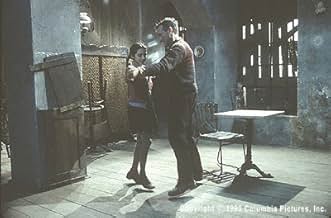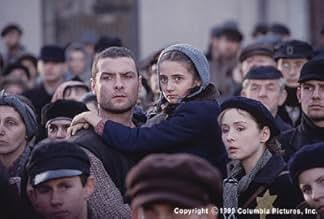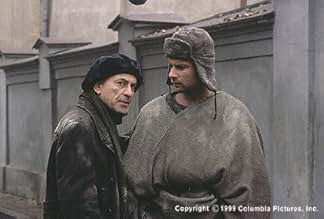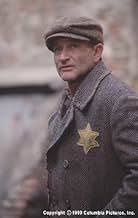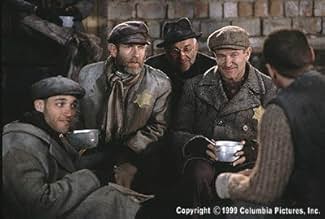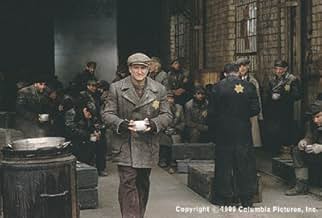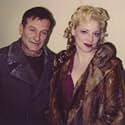IMDb-BEWERTUNG
6,5/10
18.478
IHRE BEWERTUNG
Ein gewöhnlicher Bewohner eines Ghettos fälscht während Des zweiten Weltkriegs Nachrichten Über Alliierte offensiven, um andere Opfer des NS-Regimes zu wecken.Ein gewöhnlicher Bewohner eines Ghettos fälscht während Des zweiten Weltkriegs Nachrichten Über Alliierte offensiven, um andere Opfer des NS-Regimes zu wecken.Ein gewöhnlicher Bewohner eines Ghettos fälscht während Des zweiten Weltkriegs Nachrichten Über Alliierte offensiven, um andere Opfer des NS-Regimes zu wecken.
- Regie
- Drehbuch
- Hauptbesetzung
- Auszeichnungen
- 2 Gewinne & 3 Nominierungen insgesamt
Éva Igó
- Lina's Mother
- (as Eva Igo)
István Bálint
- Lina's Father
- (as Istvan Balint)
János Gosztonyi
- Samuel
- (as Janos Gosztonyi)
Ádám Rajhona
- The Whistler
- (as Adam Rajhona)
Péter Rudolf
- Roman
- (as Peter Rudolf)
Empfohlene Bewertungen
If you are interested in the holocaust, and want to be entertained at the same time, Jakob the Liar is your film. This is not intended to be an historical film. And, to be sure, it isn't.
Just speaking for myself, I wish everyone would educate themselves about this horrible episode in human history. If you have a friend who refuses to watch honest historical films, turn them on to Jakob the Liar. It IS Robin Williams, after all. For sure, this film will encourage them to learn more about the holocaust. Its very entertaining and does give some superficial insight into what the atrocity was all about.
Robin Williams did his best. He did a fine job in this film, and deserves even more credit just for making the attempt. On a scale of 1 to 10, I'd give it an 8.
Just speaking for myself, I wish everyone would educate themselves about this horrible episode in human history. If you have a friend who refuses to watch honest historical films, turn them on to Jakob the Liar. It IS Robin Williams, after all. For sure, this film will encourage them to learn more about the holocaust. Its very entertaining and does give some superficial insight into what the atrocity was all about.
Robin Williams did his best. He did a fine job in this film, and deserves even more credit just for making the attempt. On a scale of 1 to 10, I'd give it an 8.
What I like about Jakob's tale is that Jakob is no natural hero who sets out to keep hope alive. Far from it. He is an ordinary man, and as terrified of the Nazis as any of his neighbors in the ghetto. He blunders his way into his unlikely role as a keeper of hope, and once there, cannot see from moment to moment how he can maintain it, wishes at times he could be rid of the burden, and yet somehow, manages to continue to inspire others who are so desperate for hope, they don't even try to disbelieve. In short, don't be fooled by the title: Jakob is just this guy; plotwise, he is only a hub around which a large wheel turns.
There were parts that didn't work for me, especially pieces where narration would have worked better than a character monologue (Jakob is a narrator as well as a character, so why does he talk to himself instead of us so much?) But on the whole, it was a good story, well performed by those involved.
The ending, which I shall refrain from describing for the benefit of any who have not seen it, is absolutely fitting. It is surreal, which may bother some, but leaves the door open to so many interpretations that you will wonder whether to take it as the true end, or whether it was Jakob's final lie. And fittingly, the decision is left in the mind of the viewer.
There were parts that didn't work for me, especially pieces where narration would have worked better than a character monologue (Jakob is a narrator as well as a character, so why does he talk to himself instead of us so much?) But on the whole, it was a good story, well performed by those involved.
The ending, which I shall refrain from describing for the benefit of any who have not seen it, is absolutely fitting. It is surreal, which may bother some, but leaves the door open to so many interpretations that you will wonder whether to take it as the true end, or whether it was Jakob's final lie. And fittingly, the decision is left in the mind of the viewer.
Jakob the Liar features a good straight-up performance by Robin Williams and a terrific supporting cast, but more than that it is a surprisingly complex film that reflects many of the classic traits of Yiddish humor. In Yiddish humor, the shtetl, or classic village, as immortalized in the wonderful stories of Sholomon Aleichem (think Fiddler on the Roof and Tevya, which is a direct adaptation from Aleichem's tales) are full of set characters - and they are here - the Professor is like the Rebbe, Jakob is a schnorre (someone who loves to get things for free) who becomes the mensch (the upstanding man), and so on.
Of all the films in the Holocaust corpus this is one of the few that reflects with fantasy and imagination and humor what suffering means in Jewish culture. One can argue that films about the Holocaust necessarily are depressing (or must have that Hollywood lift of hope - why?! - there was no hope) - but here there is a genuine attempt to speak into the culture of Ghetto Judaism and refer back to Aleichem's wonderful mix of family, suffering, and laughter.
The film is not wholly successful - the humour is wry, but it never quite gets to the sorrow in it, and replaces that with genuine sorrow. However it defies our norms of this style of film and as such, very correctly, challenges our notions and images of daily life outside the camps.
All in all this rewards viewing at a deeper level than simply a man who invents a radio to give others hope - it is a real reflection of pre-war Judaic humor and as such is a very worthwhile attempt to preserve the deeper meaning of a Jewish understanding that humor is one of the better ways, and sometimes the only way, to cope when darkness falls.
Of all the films in the Holocaust corpus this is one of the few that reflects with fantasy and imagination and humor what suffering means in Jewish culture. One can argue that films about the Holocaust necessarily are depressing (or must have that Hollywood lift of hope - why?! - there was no hope) - but here there is a genuine attempt to speak into the culture of Ghetto Judaism and refer back to Aleichem's wonderful mix of family, suffering, and laughter.
The film is not wholly successful - the humour is wry, but it never quite gets to the sorrow in it, and replaces that with genuine sorrow. However it defies our norms of this style of film and as such, very correctly, challenges our notions and images of daily life outside the camps.
All in all this rewards viewing at a deeper level than simply a man who invents a radio to give others hope - it is a real reflection of pre-war Judaic humor and as such is a very worthwhile attempt to preserve the deeper meaning of a Jewish understanding that humor is one of the better ways, and sometimes the only way, to cope when darkness falls.
Don't be put off by the negative comments. If you like the characters Robin Williams creates, and you like unusual dramas, you'll like Jakob the Liar. The film wanted to be Roberto Benigni and Life is Beautiful but never seemed to have the courage to go there, even with Robin Williams in the lead, until the last few scenes of the movie. However, being another Life is Beautiful is asking an awful lot. Life is Beautiful is one of the great films of all time. Having said that, Jakob the Liar is fiendishly good, creatively done, and Robin Williams does a fine job, even when Hannah Taylor-Gordon, who plays Lina, wasn't stealing every scene she was in. So, settle down and give this little movie a try. If nothing else, it's another solid performance by Robin Williams.
I was completely stunned at how well Robin Williams pulled off more serious dramatic roles, since he's much more well-known for high-energy comedy. But his roles as the bad guy in movies like Insomnia or, even better, One Hour Photo display the extent of his acting abilities, since he is able to pull off such different characters so well. In Jakob the Liar, his comedic talents are restricted just enough so that he is able to function properly within the atmosphere of the movie, but is still allowed a scene or two in which his ability to get laughs can come out. He plays Jakob, a Jewish shopkeeper in a Nazi ghetto who tells a friend that he has a radio in order to prevent that friend from committing suicide.
Things do not appear to be going well within the ghetto, the war seems like it will never end, and morale among the imprisoned Jews is steadily waning, resulting in suicides left and right. As Jakob finds a friend of his doing something that will certainly get him killed by the Nazis (this particular friend decided to make a ham-handed attempt at escape rather than overtly kill himself), Jakob runs to him and tells him that he heard on the radio that the Russians were closing in and would liberate them any day. His skeptical friend doubts him, so Jakob quickly tells him that he has a radio so that he will believe the Russians will be there to save them all soon, and his friend's suicide is prevented.
By the next morning, literally everyone in the ghetto knows that Jakob Heym has a radio, and so he is venerated like a God and constantly hounded about what the newest news is, and thus enters the main conflict of the movie. And speaking of which, one of the things that I really liked about the movie was the complexity of its conflict. It's a conflict that you sit there knowing what needs to happen for a happy ending and so you sit there and hope for that, because every option has terrible consequences.
Jakob, first and foremost, is absolutely terrified that word will reach the Nazis who will execute him if they discover he has a radio (whether he really has it or not), yet at the same time he can't let it get out within the ghetto that he DOESN'T have a radio, because since the whole rumor began the rampant suicides have completely ceased. What he has to do, then, is walk the fine line between delivering lots of fictitious good news to the whole ghetto without letting the Nazis find out about it.
There is definitely something that needs to be said about the importance of a movie like this. Obviously, holocaust movies are nothing new, and different depictions of the holocaust have been especially in the spotlight since Roberto Benigni made a holocaust movie called Life Is Beautiful in 1997, at least half of which was a comedy. A lot of people felt that it was distasteful to present something as serious and tragic as the holocaust in such a light. And not just average moviegoers like me, either. Spielberg thought it was too lighthearted for such weighty subject matter, and from a certain point of view, he's right. On the other hand, however, the fact that you laughed during the film does not change the meaning of the war that it focuses on. The Nazis killed funny people, too.
I read a review on the title page for Jakob the Liar here on the IMDb, where a reviewer who completely missed the boat on this movie criticized it for things like the comedic content, the behavior and presentation of the Jews of the ghetto, and the choice of Robin Williams for the role of Jakob Heym. To be perfectly honest, I can never understand people like that. The way I see it, as long as a movie takes the holocaust seriously then it should not be criticized for being a holocaust film that's not in the right format or that had an actor who has done too many comedy roles. This same reviewer, by the way, praised Life Is Beautiful, a spectacular film, as is Jakob the Liar.
I can certainly understand that there are people who are touchy about the holocaust. It is inarguably one of the most tragic events in all of recorded human history, made even more tragic by the fact that it was perpetrated by humans against other humans. It's sickening. But there are no jokes about the holocaust in Jakob the Liar. The Jews do not act like victims. It is historically accurate and does not compromise the truth of what happened for the sake of entertainment. It presents a story of a ghetto full of captive Jews who have had their lives stolen from them and are desperate for some hope, and one man tries to help and inadvertently finds himself in a position to provide massive amounts of hope to them, but at massive risk to his own safety.
So if you don't like to see Robin Williams playing serious, dramatic roles (roles at which he is increasingly displaying his massive talent ), don't watch the movie! It is neither a secret that Williams is in the movie, nor that it's a serious role. One look at the cover box will tell you that. But if it's the holocaust being taken seriously that troubles you, maybe you should be more concerned about the fact that there are people, alive TODAY, here in the 21st Century, and presumably relatively educated American citizens, who DO NOT BELIEVE THAT THE HOLOCAUST EVER EVEN HAPPENED. So like I said, if you're that concerned about the portrayal of the holocaust, maybe focus your efforts on these nutcases who have convinced themselves that the holocaust itself is just a fable. Maybe a myth that mothers started telling their kids to make them scared of Germans or some other such nonsense.
Jakob the Liar has no illusions, it takes a tragedy in human history and tells a story of a man who did what he could to help those suffering around him, and Robin Williams should obviously be commended for the power of his performance, as should the rest of the cast. The thing to keep in mind is that there is no certain perspective from which to view things like the holocaust. Everyone has different thoughts and feelings about it, and in the movies these different perspectives can be provided in different ways without compromising the severity and finality of the event itself. Jakob the Liar does not at all trivialize the holocaust in any way, what it does is honor the loss of its victims, who came from all walks of life.
Things do not appear to be going well within the ghetto, the war seems like it will never end, and morale among the imprisoned Jews is steadily waning, resulting in suicides left and right. As Jakob finds a friend of his doing something that will certainly get him killed by the Nazis (this particular friend decided to make a ham-handed attempt at escape rather than overtly kill himself), Jakob runs to him and tells him that he heard on the radio that the Russians were closing in and would liberate them any day. His skeptical friend doubts him, so Jakob quickly tells him that he has a radio so that he will believe the Russians will be there to save them all soon, and his friend's suicide is prevented.
By the next morning, literally everyone in the ghetto knows that Jakob Heym has a radio, and so he is venerated like a God and constantly hounded about what the newest news is, and thus enters the main conflict of the movie. And speaking of which, one of the things that I really liked about the movie was the complexity of its conflict. It's a conflict that you sit there knowing what needs to happen for a happy ending and so you sit there and hope for that, because every option has terrible consequences.
Jakob, first and foremost, is absolutely terrified that word will reach the Nazis who will execute him if they discover he has a radio (whether he really has it or not), yet at the same time he can't let it get out within the ghetto that he DOESN'T have a radio, because since the whole rumor began the rampant suicides have completely ceased. What he has to do, then, is walk the fine line between delivering lots of fictitious good news to the whole ghetto without letting the Nazis find out about it.
There is definitely something that needs to be said about the importance of a movie like this. Obviously, holocaust movies are nothing new, and different depictions of the holocaust have been especially in the spotlight since Roberto Benigni made a holocaust movie called Life Is Beautiful in 1997, at least half of which was a comedy. A lot of people felt that it was distasteful to present something as serious and tragic as the holocaust in such a light. And not just average moviegoers like me, either. Spielberg thought it was too lighthearted for such weighty subject matter, and from a certain point of view, he's right. On the other hand, however, the fact that you laughed during the film does not change the meaning of the war that it focuses on. The Nazis killed funny people, too.
I read a review on the title page for Jakob the Liar here on the IMDb, where a reviewer who completely missed the boat on this movie criticized it for things like the comedic content, the behavior and presentation of the Jews of the ghetto, and the choice of Robin Williams for the role of Jakob Heym. To be perfectly honest, I can never understand people like that. The way I see it, as long as a movie takes the holocaust seriously then it should not be criticized for being a holocaust film that's not in the right format or that had an actor who has done too many comedy roles. This same reviewer, by the way, praised Life Is Beautiful, a spectacular film, as is Jakob the Liar.
I can certainly understand that there are people who are touchy about the holocaust. It is inarguably one of the most tragic events in all of recorded human history, made even more tragic by the fact that it was perpetrated by humans against other humans. It's sickening. But there are no jokes about the holocaust in Jakob the Liar. The Jews do not act like victims. It is historically accurate and does not compromise the truth of what happened for the sake of entertainment. It presents a story of a ghetto full of captive Jews who have had their lives stolen from them and are desperate for some hope, and one man tries to help and inadvertently finds himself in a position to provide massive amounts of hope to them, but at massive risk to his own safety.
So if you don't like to see Robin Williams playing serious, dramatic roles (roles at which he is increasingly displaying his massive talent ), don't watch the movie! It is neither a secret that Williams is in the movie, nor that it's a serious role. One look at the cover box will tell you that. But if it's the holocaust being taken seriously that troubles you, maybe you should be more concerned about the fact that there are people, alive TODAY, here in the 21st Century, and presumably relatively educated American citizens, who DO NOT BELIEVE THAT THE HOLOCAUST EVER EVEN HAPPENED. So like I said, if you're that concerned about the portrayal of the holocaust, maybe focus your efforts on these nutcases who have convinced themselves that the holocaust itself is just a fable. Maybe a myth that mothers started telling their kids to make them scared of Germans or some other such nonsense.
Jakob the Liar has no illusions, it takes a tragedy in human history and tells a story of a man who did what he could to help those suffering around him, and Robin Williams should obviously be commended for the power of his performance, as should the rest of the cast. The thing to keep in mind is that there is no certain perspective from which to view things like the holocaust. Everyone has different thoughts and feelings about it, and in the movies these different perspectives can be provided in different ways without compromising the severity and finality of the event itself. Jakob the Liar does not at all trivialize the holocaust in any way, what it does is honor the loss of its victims, who came from all walks of life.
Wusstest du schon
- WissenswertesThis movie and Jakob, der Lügner (1974) were both based on the novel "Jakob der Lügner," written in 1969 by the East German author Jurek Becker. As Jews, Becker and his parents were placed in a Polish Ghetto in 1939. In order to save him from deportation, his parents gave the Germans a false birth date; Becker forgot his real birth date and was never able to discover it later in life. Although he was eventually sent to the concentration camps Ravensbrück and Sachsenhausen, both he and his father survived the war; his mother died of malnutrition after being freed from the camp. His novel "Jakob der Lügner" won the Heinrich-Mann Prize for literature in 1971; Becker died in 1997 of cancer.
- PatzerThe train locomotive in the lower left-hand corner of the DVD cover artwork is correct for southern California when the movie was released in 1999, but it's totally wrong for the movie's setting in 1944 Poland. Its cab profile was used on various diesel-electric models built by General Motors for the North American market from the early 1960s onwards, it has 1990s-style dual low-mounted safety lights, and its red-and-gray paint scheme bears an uncanny resemblance to that used by the Southern Pacific Railroad in the western United States in the late 20th century.
- Zitate
[first lines]
Jakob Heym: Hitler goes to a fortune-teller and asks, "When will I die?" And the fortune-teller replies, "On a Jewish holiday." Hitler then asks, "How do you know that?" And she replies, "Any day you die will be a Jewish holiday."
- Crazy CreditsSpecial thanks to the city and peoples of Piotrków, Poland, the city and peoples of Lódz, Poland and the city and peoples of Budapest, Hungary.
- SoundtracksBeer Barrel Polka (Roll Out The Barrel)
Written by Lew Brown, Wladimir A. Timm (as Wladimir Timm), Jaromir Vejvoda & Vasek Zeman
Performed by The Andrews Sisters
Courtesy of MCA Records
By Arrangement with Universal Music Special Markets
Top-Auswahl
Melde dich zum Bewerten an und greife auf die Watchlist für personalisierte Empfehlungen zu.
- How long is Jakob the Liar?Powered by Alexa
Details
Box Office
- Budget
- 45.000.000 $ (geschätzt)
- Bruttoertrag in den USA und Kanada
- 4.956.401 $
- Eröffnungswochenende in den USA und in Kanada
- 2.056.647 $
- 26. Sept. 1999
- Weltweiter Bruttoertrag
- 4.956.401 $
Zu dieser Seite beitragen
Bearbeitung vorschlagen oder fehlenden Inhalt hinzufügen



